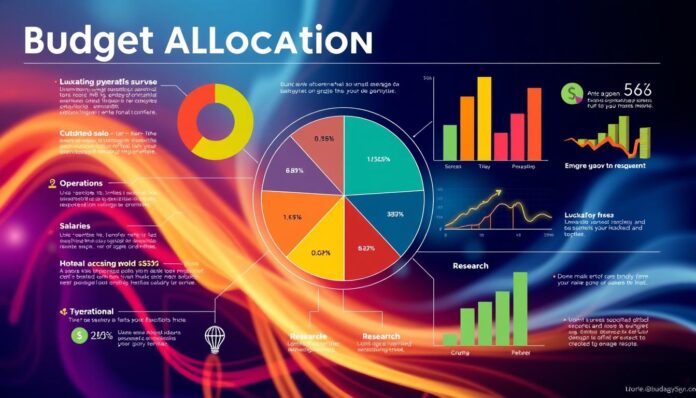Imagine opening a new café in your area, filled with the smell of coffee and lively chatter. Behind this scene is a key element for success—a good budget plan. Sadly, many start-ups fail because they don’t plan their finances well. This can lead to big problems.
In this article, we’ll show you how to make a budget plan that works for your business. It will help you manage money and make smart choices. This way, your café can not only survive but also grow in a tough market.
Table of Contents
Key Takeaways
- A robust budget allocation business plan is key for success.
- Working with team members helps understand financial needs.
- Having a backup plan in your budget can reduce risks.
- Keeping an eye on spending helps check if you’re on track.
- Simple, flexible budgets are vital for handling changing costs.
- Looking at past data and forecasting helps set realistic goals.
- Clear budgeting can attract investors and aid in making decisions.
Understanding the Importance of a Budget Allocation Business Plan
For any business leader, knowing how to allocate a budget is key. It’s about spreading out a company’s money fairly among different areas. This way, each part of the business gets enough to work well.
This method helps match spending with what’s important for the company. It also looks at how much money is coming in and what each department needs.
Defining Budget Allocation
Budget allocation is about using limited resources wisely. Knowing the different budgeting methods can improve your financial planning. Here are some common ones:
- Incremental Budgets: This method updates last year’s budget by a certain percentage to cover new costs.
- Zero-Based Budgets: Every department must explain their spending, starting from zero.
- Value Proposition Budgets: This balances spending with the value it brings, unlike incremental and zero-based.
- Activity-Based Budgets: Focuses on goals, making it good for new businesses looking to manage funds well.
The Role of Budgeting in Financial Performance Evaluation
Good budgeting is essential for checking how well a business is doing financially. By comparing actual spending to budgeted amounts, you can spot and fix problems. This helps manage resources better.
It also helps businesses see financial risks and find ways to get better. Sadly, only 54% of small businesses have a budget. This leaves many open to spending too much. A solid budgeting system is not just for keeping track of money. It’s also for planning for the future.
Setting Financial Goals for Your Business
Creating clear financial goals is key to a good budget plan. These goals should match your company’s main aims. This ensures resources are used well to meet important targets. Setting goals accurately helps guide decisions and manage resources better.
Aligning Goals with Company Priorities
Your financial goals should match your business’s mission and vision. Aligning them with company priorities helps your team aim for success. Involve different departments in the business budget analysis to get their views. This teamwork ensures everyone knows their part in achieving financial success.
Using Historical Data for Realistic Target Setting
Use past data to set realistic financial goals. Historical metrics show how your business has spent, earned, and grown. This helps set targets that are within reach, improving your budget strategy.
Focus on specific goals like increasing revenue, profit margins, or improving cash flow. These goals will help measure success and motivate your team to do better.
Estimating Income and Deriving Cash Flow
Estimating income is key in budgeting. By using financial forecasting, you can predict future earnings. This helps in managing cash flow and planning resources.
Use of Financial Forecasting Techniques
Financial forecasting uses many methods to forecast income. It looks at past sales, market trends, and economic factors. Accurate forecasting helps make better decisions and adjust financial plans.
Capitalising on Revenue Projections
Good revenue projections help plan spending better. They let you focus on what’s important and avoid budget problems. This way, you can handle unexpected costs with confidence.
It’s also important to check how your budget is doing. This ensures your financial plans match real results. Regular checks help adjust your budget and improve cash flow all year.
| Financial Metric | Description |
|---|---|
| Revenue Projections | Estimates of future income based on historical data and market trends. |
| Cash Flow Management | Oversight of cash inflows and outflows, ensuring liquidity for operations. |
| Financial Forecasting | Techniques to predict future financial performance, aiding strategic planning. |
For more on budgeting, check out this detailed guide.
Identifying and Classifying Business Expenses
Understanding your business expenses is key to a good budget plan. By sorting out your costs, you can see how healthy your finances are.
Understanding Fixed and Variable Costs
Expenses fall into two main groups: fixed and variable. Fixed costs stay the same, like rent or salaries. Variable costs change with your business activity, like materials and labour.
Knowing these types helps you predict your spending better.
Recognising One-Time and Unexpected Expenses
It’s also important to spot one-time and unexpected costs. One-time costs are rare buys or big investments. Unexpected costs come from surprises, like broken equipment.
Planning for these can help keep your finances stable.
For more tips on budgeting, check out budgeting and expenditure planning.
Creating Your Budget Allocation Business Plan
Creating a detailed budget plan is key for good financial management. It starts with using data on income and expenses. It’s important to get insights from different departments to meet each area’s needs.
Steps to Drafting the Budget Plan
Start by looking at both fixed and variable costs. Fixed costs, like rent and salaries, need exact figures because they happen every month. Variable costs, like utilities, change and should be estimated carefully.
It’s wise to use last year’s income when setting financial goals. Make a few different revenue forecasts to prepare for different market scenarios. Adjust your budget based on how costs can change, like marketing or legal fees. This way, your budget can handle both good and bad times.
Engaging with Department Heads for Input
Getting input from department heads is vital. They can share their financial needs and priorities. This helps in making a budget that really works for everyone.
By talking with department heads, you can find ways to move money to better uses. This careful look at spending helps make a budget that’s smart for today’s economy. Getting insights from all departments makes your budget plan better.
| Type of Expense | Examples | Characteristics |
|---|---|---|
| Fixed Expenses | Rent, salaries, insurance | Consistent amount, predictable |
| Variable Expenses | Utilities, office supplies | Fluctuates with usage |
| Capital Costs | Building purchase | One-time significant investment |
Implementing Cost Control Strategies
Keeping your business financially healthy is key. Focus on getting better deals from suppliers and finding ways to cut costs. This helps manage expenses better and makes your budget more flexible. Let’s look at how to achieve these goals.
Negotiating with Suppliers for Better Rates
Talking to suppliers about prices is important for saving money without losing quality. Good relationships with suppliers can lead to lower prices and extra benefits. It’s smart to compare prices from different suppliers to get the best deal.
Determining Areas for Cost Reduction
Finding where to cut costs needs careful thought. Look at your business expenses closely. Here are some key areas to consider:
| Expense Category | Potential Reduction Strategies |
|---|---|
| Labour Costs | Use better scheduling and workload management. |
| Material Costs | Check suppliers and look for bulk deals. |
| Operational Expenses | Invest in technology to make processes more efficient. |
| Indirect Costs | Look at utility use and find cheaper service providers. |
It’s important to track your costs as they happen. This helps spot any changes and lets you adjust quickly. Staying disciplined with your expenses gives you the insight to keep a close eye on your finances. For more on budgeting, check out this guide.
Monitoring and Adjusting Your Budget Plan
After setting your budget, it’s key to keep an eye on it and make changes as needed. Use budgeting tools to track your spending and income. This way, you can adjust your finances to stay on target with your goals.
Utilising Budgeting Tools for Effective Tracking
Good budget monitoring means setting budgets for each area of your finances and checking how you’re doing. Small businesses find this helpful for planning and checking their progress. There are many tools out there, like spreadsheets for flexibility but they can be slow and error-prone.
Budgeting software offers live tracking and detailed reports but might cost more. Checking your bank and credit card statements regularly helps keep your records up to date. This ensures you have a clear picture of your business’s finances.
Assessing Financial Performance Against the Budget
It’s important to regularly check how your finances are doing against your budget. This helps spot any problems early on, which can prevent bigger financial issues. Different budgeting methods, like zero-based and performance-based, help match your resources with your goals.
By keeping a close eye on your budget, you can help your business grow and stay flexible in a changing market. Learn more about creating a budget allocation business plan to improve your financial management.
Incorporating Feedback for Continuous Improvement
Getting feedback from your team is key to improving your budgeting process. It helps you tackle new challenges and follow the best practices. This way, your budget gets better, and your whole team becomes more flexible.
Seeking Insights From Team Members
Talking to different people gives you new ideas for budgeting. You need to know who to talk to, like:
- Customers
- Employees
- Investors
- Suppliers
- Community members
To get feedback, you can use surveys, focus groups, and listening to what people say online. This helps you see how you compare to others and check if people are happy with your service.
Reviewing and Adjusting According to Business Needs
Changing your budget often is important. You should keep up with market changes and how your team is doing. This means:
- Figuring out what you’re good at and what you’re not
- Setting goals that are achievable
- Improving your financial plans to use resources wisely
By listening to feedback, you can make your plans better. This makes your budget more accurate and helps avoid spending too much. Using new tech like predictive analytics can also make your budgeting more flexible.
Conclusion
Success in budgeting comes from good resource management and smart financial planning. Understanding the value of budgeting helps you create a strong financial strategy. This strategy prevents overspending and ensures resources are well used across departments.
Regular budget reviews help spot and fix any ongoing issues. They also encourage a culture of responsibility in your team.
Getting your team involved in budgeting boosts teamwork and communication. This leads to a better understanding of your organisation’s goals. As we’ve discussed, using different budget types helps predict income and expenses. This makes it easier to spot financial challenges and opportunities for better resource use.
Spending time on a detailed budget plan is key to your business’s growth. For more tips on budget planning, check out the full article on budget allocation strategies. Use flexible budgeting methods that fit your business needs. This keeps your financial forecasts reliable and useful.
FAQ
What is a budget allocation business plan?
A budget allocation business plan is a strategic plan. It shows how money is spent across different areas of a company. It makes sure spending matches business goals and improves how resources are used.
Why is financial forecasting important in budgeting?
Financial forecasting is key. It helps businesses predict future income based on past data and trends. This helps in managing cash flow and allocating resources well.
How can I set realistic financial goals for my business?
To set realistic financial goals, align them with your company’s main priorities. Use past data to set targets that match your financial ability.
What types of business expenses should I consider?
Consider fixed costs like rent and salaries, which are steady. Also, think about variable costs that change with business activity. Don’t forget to plan for one-time and unexpected costs to keep finances stable.
How do I engage departmental heads when creating my budget plan?
To engage departmental heads, ask for their input on financial needs and priorities. This makes sure money is spent wisely and on the right things, promoting accountability.
What strategies can I implement for cost control?
For cost control, try negotiating better deals with suppliers. Look for ways to cut expenses and manage spending well. This helps keep your budget sustainable.
How can I monitor my budget effectively?
To monitor your budget well, use budgeting tools to track expenses and income. This lets you make changes quickly. Regular checks of financial performance against the budget help spot issues and keep goals on track.
What role does team feedback play in budgeting?
Team feedback is vital for budgeting. It leads to ongoing improvement in the budgeting process. It helps tackle new challenges and adjust the budget as needed.






